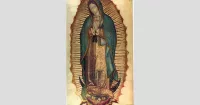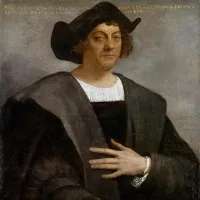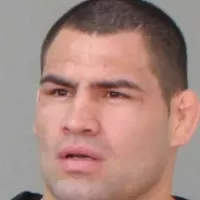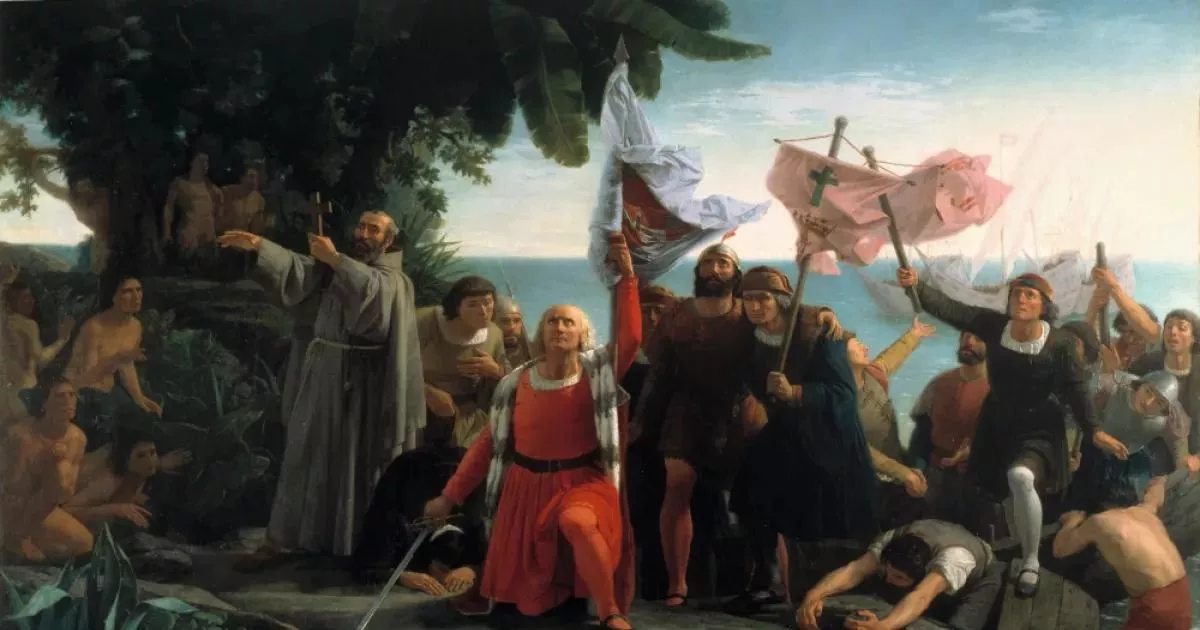Columbus Day commemorates Christopher Columbus's arrival in the Americas on October 12, 1492. Landing on Guanahaní in the Bahamas, Columbus established contact with indigenous populations. The holiday also marks the beginning of European colonization of the Americas, including the establishment of La Isabela in Hispaniola, the first permanent Spanish settlement.
1905: Colorado Proclaims First Statewide Columbus Day Holiday
In 1905, Colorado governor Jesse F. McDonald proclaimed the first statewide Columbus Day holiday.
1907: Columbus Day Becomes Statutory Holiday in Colorado
In 1907, Columbus Day was made a statutory holiday in the state of Colorado.
June 1915: Establishment of 'Fiesta de la Raza' in El Salvador
In June 1915, the official holiday of 'Fiesta de la Raza' was established in El Salvador, setting October 12 as the date of the national holiday.
1916: Day of the Race Established in Argentina
In 1916, President Hipólito Yrigoyen established the Day of the Race in Argentina by decree.
1917: Argentina Celebrates "Día de la Raza"
In 1917, Argentina first celebrated Día de la Raza (Day of the Race).
1918: Discovery of America and the Hispanicity celebrated as a national day in Spain
Since 1918, the Discovery of America and the Hispanicity has been celebrated as a national day in Spain under different names like "Día de la Hispanidad" or "Dia de la Raza", due to changes of political regimes in the 20th century.
1921: Venezuela Celebrates Día de la Raza
In 1921, Venezuela officially established and began celebrating Día de la Raza under President Juan Vicente Gómez.
1922: Chile Celebrates "Día de la Raza"
In 1922, Chile began celebrating Día de la Raza (Day of the Race).
1928: Mexico Celebrates "Día de la Raza"
In 1928, Mexico began celebrating Día de la Raza (Day of the Race).
1928: Our Lady of Guadalupe appointed Queen of Hispanicity by the Vatican
In 1928, Our Lady of Guadalupe was appointed Queen of Hispanicity by the Vatican
1934: Congress Requests Presidential Proclamation for Columbus Day
In 1934, Congress passed a statute requesting the President to issue a proclamation designating October 12 as Columbus Day.
1936: Federico Laredo Brú becomes president of Cuba
In 1936, Federico Laredo Brú became president of Cuba and served until 1940.
December 1937: Cuban and Dominican aviators travel through Latin America to collect funds for a lighthouse
In December 1937, Cuban president Federico Laredo Brú and Dominican Republic president Rafael Trujillo sent aviators through Latin America to collect funds for a lighthouse, inspired by Columbus's journey. On December 15, two planes (Colon and La Pinta) were forced to land in Pisco and Niña disappeared in the storm. The expedition, consisting of Stinson Reliant SR-9s named Santa María, Niña and Pinta, and a Curtiss Wright CW-19R named Colon encountered a storm, resulting in crashes. On December 29 Niña, La Pinta, and Santa Maria crashed into high mountains, while Colon, unaware of the other aircraft, flew over the storm and safely made it to Panama City.
1937: Cuban President Federico Laredo Brú commemorates Christopher Columbus's voyage
In 1937, Cuban President Federico Laredo Brú commemorated Christopher Columbus's voyage to the New World on October 12. He spoke about Columbus's impact and venerated his efforts to colonize, expressing pride in his nation and its political infrastructure at the time.
1940: Federico Laredo Brú's presidency ends
In 1940, Federico Laredo Brú's presidency ended.
1942: Roosevelt Announces Removal of "Enemy Alien" Designation for Italian Americans
On Columbus Day in 1942, President Franklin Roosevelt announced the removal of the designation of Italian Americans as "enemy aliens" and proposed offering citizenship to elderly Italians in the U.S.
September 8, 1943: Release of Italian Americans Following Italy's Surrender
Following Italy's surrender to the Allies on September 8, 1943, the Italian Americans interned in camps were released.
1957: Spain Changes Celebration to "Día de la Hispanidad"
In 1957, Spain changed its celebration from Día de la Raza to Día de la Hispanidad (Hispanicity Day).
1966: National Columbus Day Committee Founded
In 1966, Mariano A. Lucca founded the National Columbus Day Committee in Buffalo, New York, to advocate for making Columbus Day a federal holiday.
June 28, 1968: Columbus Day Established as a Federal Holiday
On June 28, 1968, legislation was signed by President Lyndon Johnson to establish Columbus Day as a federal holiday, effective beginning in 1971.
1968: Founding of the National Council of La Raza
In 1968, the National Council of La Raza, later known as UnidosUS, was founded. The organization was known as the National Council of La Raza from 1968 to 2017.
1971: Columbus Day Officially Observed as Federal Holiday
Beginning in 1971, Columbus Day became an officially recognized federal holiday in the United States, observed on the second Monday in October.
1971: Columbus Day Becomes a Federal Holiday
Since 1971, Columbus Day has been observed as a federal holiday on the second Monday in October in the United States.
1981: Royal decree establishes Fiesta Nacional y Día de la Hispanidad as a national holiday in Spain
In 1981, a royal decree established the Fiesta Nacional y Día de la Hispanidad as a national holiday in Spain.
1987: Name change to Fiesta Nacional and October 12 becoming one of two national celebrations in Spain
In 1987, the name was changed again to Fiesta Nacional, and October 12 became one of two national celebrations, along with Constitution Day on December 6.
1990: First Intercontinental Gathering of Indigenous People in the Americas
In the summer of 1990, 350 representatives from American Indian groups met in Quito, Ecuador, at the first Intercontinental Gathering of Indigenous People in the Americas, to mobilize against the 500th anniversary celebration of Columbus Day planned for 1992.
October 10, 1992: Pope John Paul II Visits Dominican Republic
On October 10, 1992, Pope John Paul II visited the Dominican Republic to celebrate the 500th anniversary of the discovery of the Americas and the arrival of Christianity, concluding with a mass in the nation's cathedral.
October 12, 1992: International Day of Solidarity with Indigenous People
On October 12, 1992, Native Americans declared it as "International Day of Solidarity with Indigenous People" at a follow-up meeting to the Quito conference to mobilize against the 500th anniversary (quin-centennial) celebration of Columbus Day.
1992: Berkeley, California, Initiates Indigenous Peoples' Day
In 1992, Berkeley, California, began eschewing Columbus Day and instead celebrated Indigenous Peoples' Day.
1992: Inauguration of the Columbus Lighthouse in Santo Domingo Este
In 1992, the Columbus Lighthouse was inaugurated in Santo Domingo Este on the 500th anniversary of the discovery of America. This monument serves as both a mausoleum and a museum.
September 21, 1994: Costa Rica Changes Holiday to Day of the Encounter of Cultures
On September 21, 1994, Costa Rica changed the official holiday from Día de la Raza to Día del Encuentro de las Culturas (Day of the Encounter of Cultures).
1996: First Hispanic March on Washington
The first Hispanic March on Washington took place on Columbus Day in 1996.
2001: Bahamas replaces Discovery Day with National Heroes Day
In 2001, the Bahamas replaced Discovery Day with National Heroes Day.
2002: Venezuela Changes Holiday to "Día de la Resistencia Indígena"
In 2002, Venezuela changed its holiday from Día de la Raza to Día de la Resistencia Indígena (Day of Indigenous Resistance).
October 12, 2004: Statue of Columbus Toppled in Caracas
On October 12, 2004, a crowd of progovernment activists toppled a statue of Christopher Columbus in Caracas, Venezuela.
2004: Columbus Day officially celebrated in Italy
In 2004, Columbus Day was officially celebrated in Italy and named Giornata nazionale di Cristoforo Colombo (National Christopher Columbus Day).
2004: Publication of Columbus-era documents highlighting exploitation
In 2004, the final volume of a compendium of Columbus-era documents was published, stating that Columbus exploited and enslaved the indigenous population.
2008: Indigenous Resistance Walk Established in Caracas
In 2008, the walk where the Columbus statue had stood was renamed "Indigenous Resistance Walk" and later, a statue of an indigenous leader, Guaicaipuro, was erected on the plinth.
2009: Peru Celebrates Indigenous Peoples and Intercultural Dialogue Day
In 2009, Peru began celebrating Día de los pueblos originarios y el diálogo intercultural, which translates to Indigenous Peoples and Intercultural Dialogue Day, on October 12th.
2010: New York City's Columbus Day Parade Draws One Million Viewers
Around 2010, New York City's Columbus Day Parade boasted over 35,000 marchers and an estimated one million viewers, making it the largest such celebration.
2010: Argentina Renames Holiday and Replaces Columbus Statue
In 2010, Argentina changed the name of the holiday to "Day of Respect of Cultural Diversity" and replaced the Columbus statue with one of Juana Azurduy.
2017: National Council of La Raza Renamed UnidosUS
In 2017, the National Council of La Raza was renamed UnidosUS, which is the largest Hispanic social justice organization in the nation.
2017: Akron City Council Split Over Replacing Columbus Day
In 2017, the city council of Akron, Ohio, became divided along racial lines over the decision to replace Columbus Day with Indigenous Peoples' Day, leading to pushback from the city's Italian-American community.
2018: Numerous Cities Celebrate Indigenous Peoples' Day
As of 2018, numerous cities, including Austin, Boise, Cincinnati, Denver, Los Angeles, Mankato, Philadelphia, Portland, San Francisco, Santa Fe, Seattle, Saint Paul, Phoenix, and Tacoma, had followed Berkeley's lead in celebrating Indigenous Peoples' Day instead of Columbus Day.
2018: Columbus, Ohio, Removes Columbus Day as City Holiday
In 2018, Columbus, Ohio, removed Columbus Day as a city holiday, choosing to honor veterans instead of Christopher Columbus.
2018: Compromise Reached in Akron Regarding Columbus Day and Indigenous Peoples' Day
In 2018, a compromise was reached in Akron, Ohio, where the city council voted to name the first Monday of October as North American First People's Day while keeping Columbus Day.
December 18, 2020: Mexico Renames Columbus Day to Day of the Pluricultural Nation
On December 18, 2020, President Andrés Manuel López Obrador decreed that October 12 be renamed "Day of the Pluricultural Nation" in Mexico. The statue of Columbus was removed and replaced with a replica of The Young Woman of Amajac.
2020: Colorado Replaces Columbus Day with Frances Xavier Cabrini Day
In 2020, Colorado replaced Columbus Day with Frances Xavier Cabrini Day, which is observed a week earlier.
2020: Columbus Day Renamed in Akron as Italian-American Heritage and Culture Day
In 2020, Columbus Day was renamed Italian-American Heritage and Culture Day in Akron, Ohio.
2020: Costa Rica Eliminates Day of the Encounter of Cultures Holiday
In 2020, Costa Rica eliminated the Day of the Encounter of Cultures holiday and now celebrates Military Abolition Day on December 1 in its place.
October 12, 2021: El Salvador Abolishes 'Fiesta de la Raza' Holiday
Since October 12, 2021, the Legislative Assembly of El Salvador abolished the previous national 'Fiesta de la Raza' holiday to vindicate the origin and identity of indigenous peoples.
2021: Belize changes Pan American Day to Indigenous Peoples' Resistance Day
In 2021, Belize changed the name of Pan American Day, observed on October 12, to Indigenous Peoples' Resistance Day to move away from its colonial legacy.
2021: Colombia Renames Holiday to Day of Ethnic and Cultural Diversity
In 2021, the Ministry of Culture of Colombia changed the name of the holiday to ‘Día de la Diversidad Étnica y Cultural de la Nación Colombiana (Day of Ethnic and Cultural Diversity of the Colombian nation).
Mentioned in this timeline
California is a U S state on the Pacific Coast...
Venezuela officially the Bolivarian Republic of Venezuela is a country...

Our Lady of Guadalupe refers to the Marian apparitions in...
Colombia officially the Republic of Colombia is a country located...

Christopher Columbus an Italian explorer and navigator completed four voyages...
The Dominican Republic is located on the eastern five-eighths of...
Trending

1 hour ago USA Women's Hockey Olympic Win Over Italy Marred by Heated Play and Officiating

1 hour ago Cain Velasquez Granted Early Parole, Announces Mental Reset Seminar Plans Post-Release.

1 hour ago Miles Teller stars in Apple TV's 'Eternity': Ending, review, and similar rom-coms.

2 hours ago The Highwomen Return: Carlile, Crow, Judd, and Spencer Reunite for Canyon Performances.

2 hours ago Raphael Veiga's game impresses fans; Adapts to Mexico after leaving Palmeiras.
2 hours ago Jalen Williams Injury Scare: Thunder Re-evaluating Hamstring After All-Star Break
Popular

Kid Rock born Robert James Ritchie is an American musician...

Pam Bondi is an American attorney lobbyist and politician currently...
Randall Adam Fine is an American politician a Republican who...

Barack Obama the th U S President - was the...
The Winter Olympic Games a major international multi-sport event held...

XXXTentacion born Jahseh Dwayne Ricardo Onfroy was a controversial yet...
